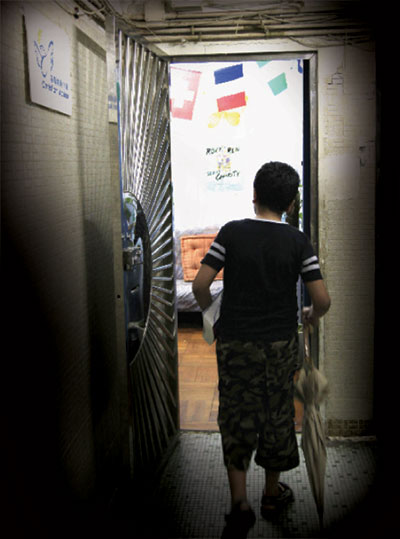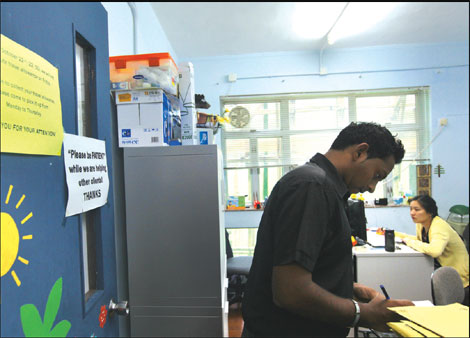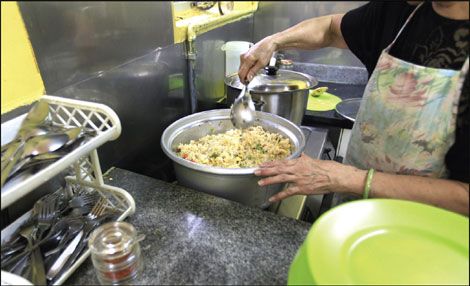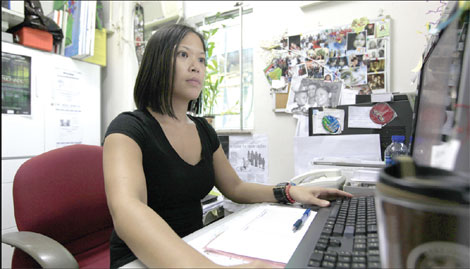Nowhere to call home
Updated: 2011-08-23 07:04
By Ming Yeung(HK Edition)
|
|||||||
|
Fady, 12, whose refugee status was granted in September 2010, now awaits resettlement to a host country. Yik Yeung-Man / For China Daily |
|
Christian Action's Chungking Mansions Service Centre offers humanitarian assistance such as basic necessities, counselling and language classes to 500 active asylum seekers at the moment. Yik Yeung-Man / For China Daily |
|
Christian Action's Chungking Mansions Service Centre provides meals three times a day to needy asylum seekers. Yik Yeung-Man / For China Daily |
|
Jonnet Bernal, assistant manager of Humanitarian Services (HK) Department of Christian Action, says signing of refugee convention is the ultimate solution to address the snowballing number of asylum seekers stranded in Hong Kong. Yik Yeung-Man / for China Daily |
Hong Kong's easy entry requirements make the city a popular destination for refugees from Africa and South Asia - but once here, refugees may find themselves facing a future in limbo. Ming Yeung reports.
It is always difficult to figure out which way is which, standing amid the maze of corridors at Chungking Mansions. The place in Tsim Sha Tsui is a well-known "mini United Nations", a haven for ethnic minorities, backpackers, and even asylum seekers.
Oscar, 18, kills a lot of time here. He's getting help from the Chungking Mansion Service Centre Hong Kong (CMSC), set up by Christian Action in 2004. It's the only refugee drop-in center in town, so, Oscar (not his real name) has become pretty adept at making his way around the place, since he arrived in Hong Kong last September.
He's not sure how long he is going to linger in the mansions seeking for help. He's waiting for the United Nations High Commission for Refugees (UNHCR) to recognize his status as a refugee, but he's is not sure how long it'll take.
Oscar is Palestinian. He has trouble calling the troubled region of the Middle East home.
"There is no country. Israelis and Palestinians always fight, so there is no country for us," he articulates in heavily accented English.
Oscar and other members of his family fled their homeland to Malaysia in 2009 and were granted refugee cards immediately. But the skinny refugee says life was no better there. Malaysia, he said, is not very welcoming of refugees.
Reports have been circulating for some years that one group of refugees who made their way into Malaysia were sold into slavery.
"They didn't give us anything, not even food and housing, nothing," he recalls.
The year of hardship in Malaysia drove them into Guangdong province on the mainland, before making their way to Hong Kong by train.
Arriving here empty-handed, Oscar and his family went straight to UNHCR seeking aid, only to find that their refugee cards obtained in Malaysia were summarily rejected here.
Oscar's family of eight made application to UNHCR for refugee status.
Before the family is confirmed as legal refugees, family members are classified as asylum seekers. Most asylum seekers in the city come from Africa and South Asia, victims fleeing wars or persecution.
Hong Kong's Immigration Department cites figures, as of Aug 14, of 10,583 applications from people claiming to be victims of torture. Among the total, 3,835 cases have been resolved; 6,748 cases are still being processed.
Torture Claim Assessment Division was set up in 2004 to determine whether someone may face torture if returned to their country of origin under the Convention Against Torture and Other Cruel, Inhuman or Degrading Treatment or Punishment.
ISS, or International Social Service, says as of March 2010, there were 6,000 asylum seekers and torture claimants. ISS is a charitable organization commissioned by the government in April 2006, to see to the welfare of refugee claimants, including food and accommodation. The agency's entire caseload is comprised of referrals from the Social Welfare Department.
UNHCR also provides assistance through ISS to refugee claimants in Hong Kong.
Refugee applicants receive no cash. If they have to pay rent, landlords will receive payment directly from ISS. Food is distributed from designated points around the city to refugee claimants every ten days, with their religious preferences taken into account.
Jonnet Bernal, assistant manager of Humanitarian Services (HK) Department of Christian Action says CMSC has around 500 active clients using its services and about 20-30 newcomers every month.
Harsh conditions
Because Oscar is over 18, he is not guaranteed placement in a school program. His request to continue his education is still pending. He thinks his prospects are pretty gloomy. "I want to study. If there's no study, I'm gonna work," he says.
Under the law, however, asylum seekers are not permitted to work. That only compounds the difficulties for those waiting to hear their fate.
"There is no money, only food. If the food is finished, we don't eat the next day," Oscar tells China Daily, adding that moving around Hong Kong is impossible.
That's why Oscar often attends CMSC events. The center provides transportation fees to get him back home.
Bernal explains that the employment ban poses major problems to traumatized people seeking refugee status. "The healing process will not start as they are not making a life out of themselves," she explains.
"While they are safer here in Hong Kong, they have no opportunity to improve themselves and no chance to move on unless they get resettled to a third country but the rate for this is minimal," Bernal notes.
For many asylum seekers and torture victims, prospects for a positive outcome of being given a new chance in a new home seem about as likely as winning the Mark 6 Lottery.
Among all those claiming to be victims of torture, "there has been one case with the torture claim substantiated," an Immigration Department spokesman says in a written reply to a query from China Daily.
"Generally speaking, it takes an average of six months to process an application," the spokesman adds. "Should a claimant lodge a petition against the decision to the Chief Executive or file an application to the courts for a judicial review against the decision, the time would vary."
UNHCR has been criticized for its lack of transparency and protracted delays in processing refugee applications.
According to information provided by the UNHCR Hong Kong Office, "it usually takes a few months (to process a case). For some particular case needing more assessment time, it will take longer."
On the question of how long it may take, on average, to settle a refugee claim and resettle applicants, the office replies, it's "very different from case to case".
As of March 2011, the office handled 513 asylum claims while refugee numbers stand at a little more than 100.
Bernal recalls that a few years back, a Somali refugee, who had been granted refugee status years earlier was still waiting for resettlement, and grew impatient at doing nothing in Hong Kong. One day, he decided to go back home to seek out his family. CMSC has lost contact with the man and remains uncertain as to his ultimate fate.
"Had UNHCR resettled him, then he would have been starting his life and would not be so worried," Bernal adds.
Fady, 12, is considered among the most fortunate of the applicants.
Fady came to Hong Kong almost four years ago with eight family members. The family members claimed to be victims of religious persecution in their home country, Egypt.
Fady's refugee status was granted in September 2010. He is awaiting resettlement to another country, possibly the US. But still, the timing of the resettlement remains a mystery.
Ambiguous position
Hong Kong is not a signatory to the 1951 United Nations Convention Relating to the Status of Refugees, hence the government claims it has no obligation to offer assistance to refugees.
When a government has no Refugee Status Determination (RSD) procedures, UNHCR takes up the duty to process applications.
UNHCR has encouraged the SAR government to establish its own RSD procedures to share in the responsibilities of assessing refugee claims. At present, the Immigration Department holds sole responsibility for that duty.
In 2009, the Law Society and Bar Association voiced their concerns about there being two separate systems for processing refugee applications.
"The UNHCR assessment process, if it were amenable to the jurisdiction of the Hong Kong courts, would not meet the high standards required," states the Joint Position Paper by the Law Society of Hong Kong and the Hong Kong Bar Association on the Framework for Convention Against Torture Claimants and Asylum Seekers. "Further, it is unfair and anomalous that the ultimate decision on the individual's refugee status by the UNHCR is not amenable to judicial scrutiny."
Still, the government is reluctant to move, with the Security Bureau saying: "Our unique situation set against the backdrop of our relative economic prosperity in the region and our liberal visa regime makes us vulnerable to possible abuses if the convention were to be extended."
Even though there has been a decline in the number on new arrivals of asylum seekers in recent years, people still come here in greater number than those who are leaving, Jonnet Bernal says.
Many asylum seekers come to Hong Kong because of its free entry policy, Bernal points out. "If you need to leave your country, you need to go where you can go fast."
It does not really matter whether these refugees come to Hong Kong legally, on board airplanes, or illegally, on boats, because eventually they overstay their visas, one way or another, Bernal stresses.
CMSC carries out its own interviews with new arrivals to assess their cases and needs. After years of experience, Bernal says, the organization has become adept at identifying false claims.
"But at the end of the day, we are not UNHCR, we are not Immigration, they are not lodging their claims with Christian Action," she says. "Here, whether you are having a valid claim or not, one thing is for sure: if you are hungry, you can eat."
Working with those who are most vulnerable since 2005, Bernal admits she has seen the condition of refugees improving but it is the signing of the refugee convention that will prove the ultimate solution.
"Should the Hong Kong government sign the convention and put a system in place, it will be able to process applications faster and this will save a huge amount of resources spent on asylum seekers residing here," Bernal says.
An anonymous asylum seeker expresses his discontent with the current state of things, on seekingrefuge.hk: "We are not here to see Hong Kong's light shows or its big buildings. We are here dreaming of becoming somebody, like lawmakers, engineers, doctors, things which we were in our home countries."
If the dream of resettling in a third country, which he envisions it to be Canada, never comes, Oscar wants to stay in Hong Kong permanently - but this may also be another fantasy after all.
(HK Edition 08/23/2011 page4)



